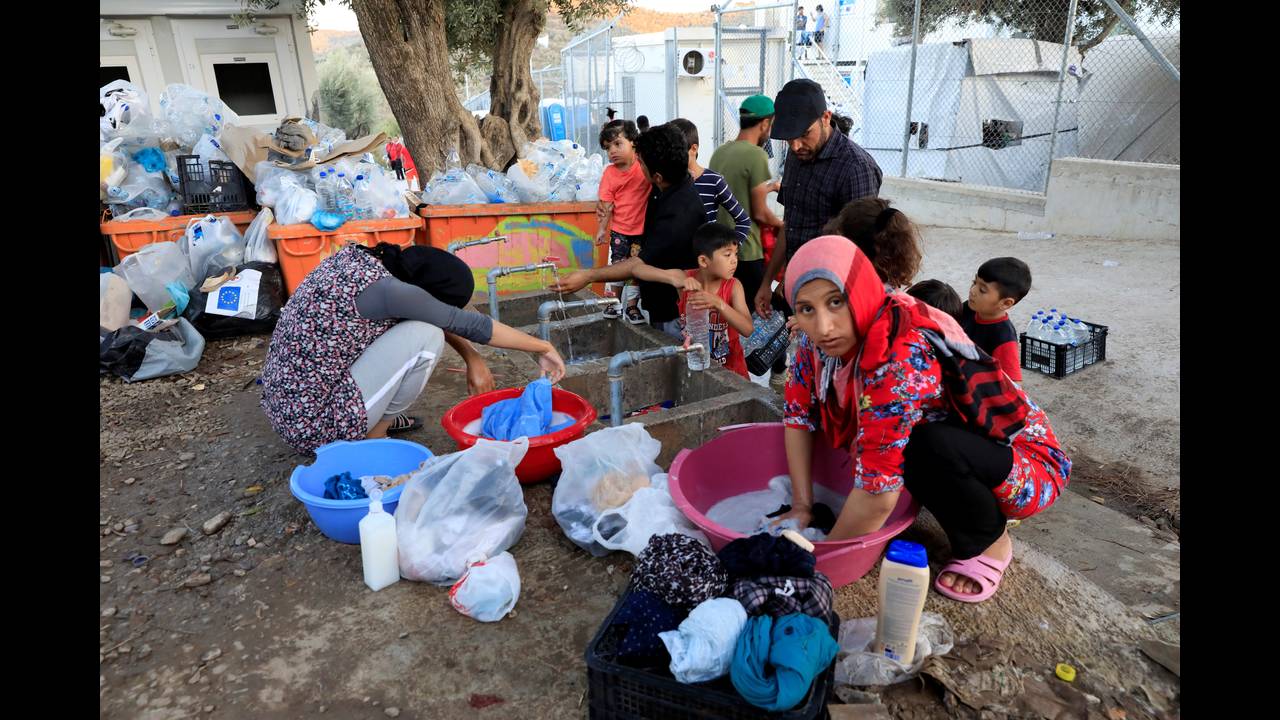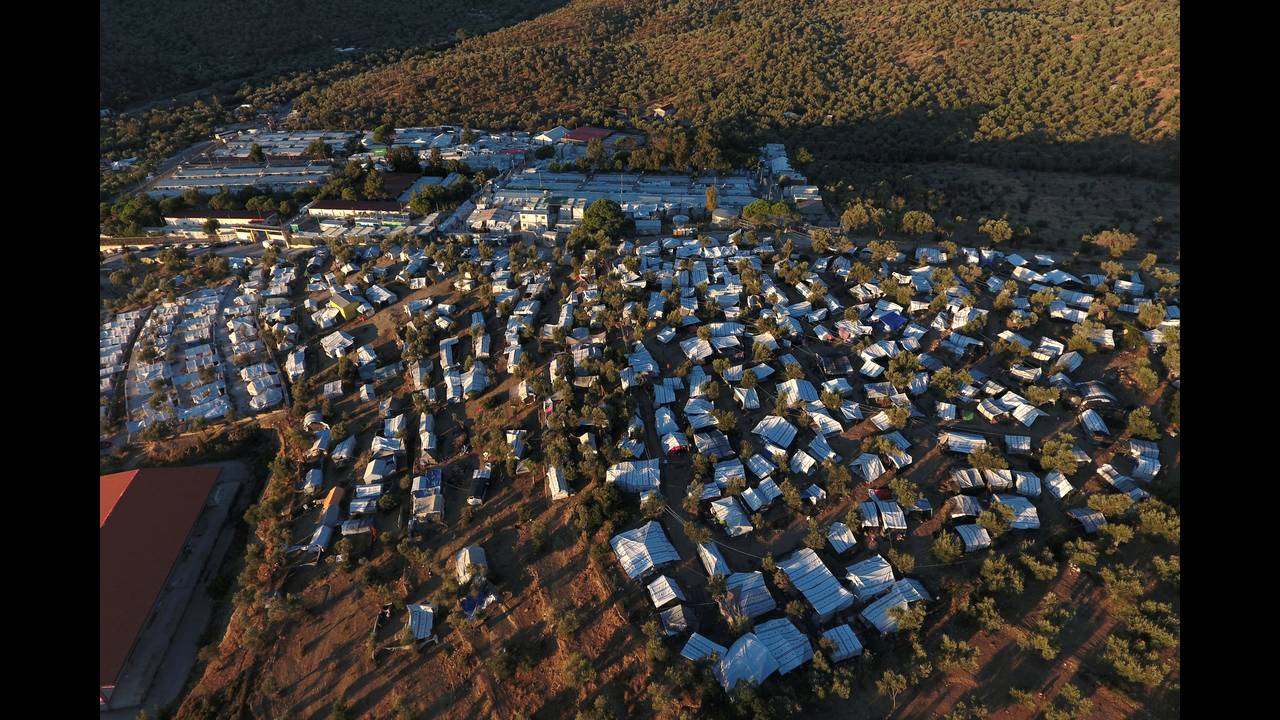“The first one, before getting out, sinks the boat to make it stop softly on the rocks. The last one is now out of the water. Frontex is there. “Border force”. The “others” stoically await the welcome.”
“This process has been going on every day, dozens of times a day, for the last month. ”They are here by the boat,” the locals say, referring to the refugees,” Maria tells me.
Maria coordinates the team of the Diotima Centre, which operates in Lesvos to manage incidents of gender-based violence. The eleven-member team, composed of specialized professionals (psychologists, social workers, interpreters/cultural mediators, and lawyers), has been in Mytilene since August.
Its aim is to provide comprehensive support to refugees who have suffered gender-based violence and are staying at the Reception and Identification Centre of Moria.
Crowding in Moria
The Centre is the largest camp in Greece. “That’s where they take all the newly arrived refugees, like the ones we saw this morning, for the first registration and assessment by the police, the first reception, and the CDC. These first procedures are very time-consuming.
Families, pregnant women with or without family, unaccompanied children, men and women traveling alone, lay whatever they find on the floor and sleep in an indoor area,” Maria tells me.
9,000 refugees live in Moria (1/3 are children), while the capacity of the center is for just 3,000 people. “Despite the fact that 500 people have recently left, the number is not decreasing. Every day we have dozens of arrivals on Lesvos” says Maria.
“In the first two weeks of September alone, more than 1,500 people arrived in Lesvos, who, lacking shelter, do not have enough food and their access to medical care is extremely limited,” says Médecins Sans Frontières.
Piled to the point of desperation, on the islands
The same situation applies to all Reception Centres on the islands, as they say, calling on the Ministry of Migration Policy, 19 organizations that operate in them, including the Diotima Centre: “Despite the announcements of the Minister of Migration Policy, for thousands of new accommodation places in the mainland and decongestion of the islands, more than 17,000 people are crammed to the point of desperation in the Reception Centres on the islands, whose capacity is for only 6,000 people.”
The confinement of thousands of refugees/islanders on the islands is the tragic result of the joint statement between the European Union and Turkey in March 2016. As part of it, the Greek government restricts refugees to five islands throughout their asylum process.
It is worth noting that, ten days ago, it was decided to lift the geographical restriction for high-vulnerability cases, which include survivors of gender-based violence.
“However, the relocation process in the heartland, even for vulnerable groups such as survivors of gender-based violence, is not easy: Survivors are required to join a long list and in this case, they may remain in the Centres for many more months.
Otherwise, there is the possibility to leave only at their own expense, which is not feasible, most of the time, and exposes them to various risks; of course, they are obliged to return when their asylum interview takes place.”
“A critical aspect, therefore, remains the speed of the process and ensuring their protection and safety conditions on the mainland, through referral and linking them to support services.”
Unsafe environment
Back to Moria: “The situation here is difficult and at the same time brutal. The center is like a favela, scattered with containers and tents. It looks like a camp that contains other camps within it. Even outside the Centre, a camp has been set up, a whole state… The deplorable conditions endanger people’s physical and mental health,” says Maria.
“The environment of Moria can in no way be described as safe. It is indicative that reports of incidents of gender-based violence committed in and around the camp are increasing.
There have even been reports of rapes, the majority of them of women, but also of men. Women are afraid to go unaccompanied, even to the toilet.
“Gender-based violence is a constant internal frontier, ostracizing and trapping hundreds of women and many men, in the ‘country’ of insecurity, despair and the trivialization of their lives.”
“This frightening reality exacerbates the situation of populations already vulnerable to gender-based violence,” Maria points out.
Dozens of incidents
In this context, what is the intervention of the Diotima Centre in Moria? “When we went to Lesvos, already 80 cases were waiting for a long time. The need for intervention was urgent. After one and a half months of our presence, we have about 5-10 new cases, per week”.
“To the refugee survivors of gender-based violence, referred to us by UNHCR, we provide psychosocial support, accompaniment, empowerment, legal support, and assistance, seeking to respond to their multiple needs,” the team leader stresses.
Multiple forms of gender-based violence
“Survivors referred to the Diotima Centre Team are usually single women, women with children heads of families, and married women from all backgrounds (Africa, Afghanistan, Syria, etc.).
The majority of cases involve women who have been raped during the journey. Indeed, a significant proportion has also suffered multiple forms of gender-based violence (genital mutilation, forced marriage, domestic violence, etc.).
Women who have been subjected to domestic violence in the shelter have also been referred to the Team.
“Our Team stands by all these women, providing them with comprehensive and specialized support and assistance while aiming to empower them to claim their rights”.
** The Diotima Centre implements a program for the prevention and treatment of gender-based violence among the refugee population residing in the urban areas of Athens, Thessaloniki, Thessalia (Larissa, Trikala, Karditsa), and Lesvos (services are provided to the populations residing in the Reception and Identification Centre of Moria). The project is funded by the International Rescue Committee (IRC), the European Civil Protection and Humanitarian Aid Operations (ECHO) and the United Nations High Commissioner for Refugees in Greece (UNHCR), for the period September 2017 – December 2018.
Reportage: Natassa Kefalinou, Communication Officer Diotima Centre
Photos: REUTERS/ Giorgos Moutafis (source)








